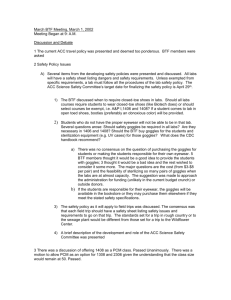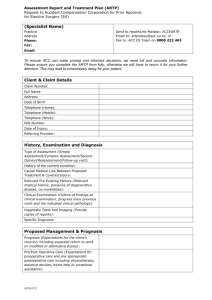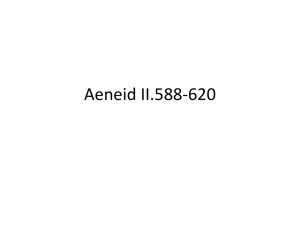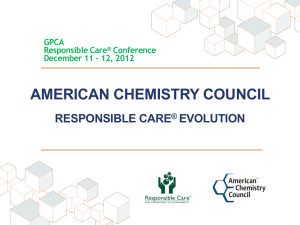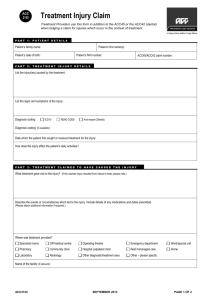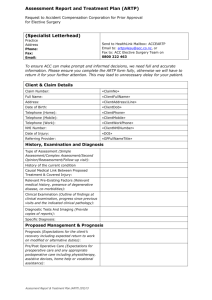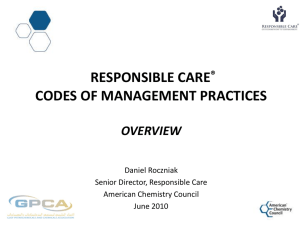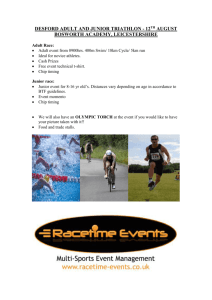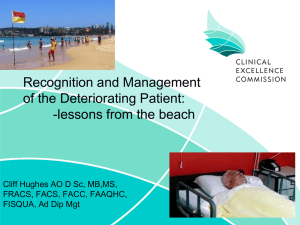September 2002 - Austin Community College
advertisement
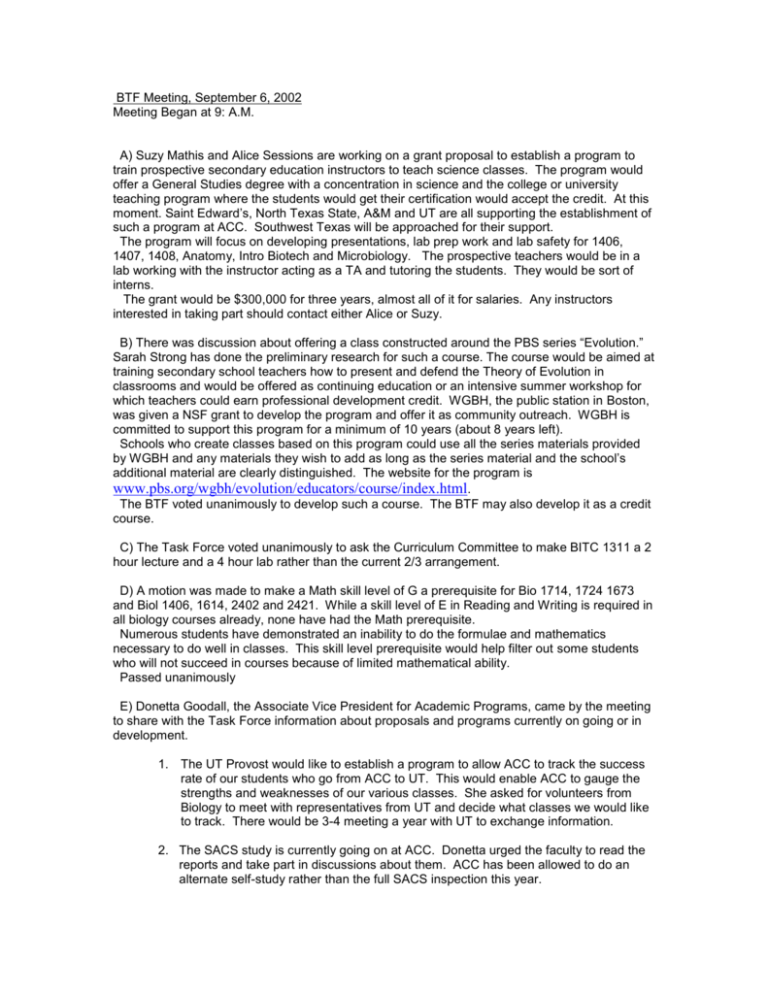
BTF Meeting, September 6, 2002 Meeting Began at 9: A.M. A) Suzy Mathis and Alice Sessions are working on a grant proposal to establish a program to train prospective secondary education instructors to teach science classes. The program would offer a General Studies degree with a concentration in science and the college or university teaching program where the students would get their certification would accept the credit. At this moment. Saint Edward’s, North Texas State, A&M and UT are all supporting the establishment of such a program at ACC. Southwest Texas will be approached for their support. The program will focus on developing presentations, lab prep work and lab safety for 1406, 1407, 1408, Anatomy, Intro Biotech and Microbiology. The prospective teachers would be in a lab working with the instructor acting as a TA and tutoring the students. They would be sort of interns. The grant would be $300,000 for three years, almost all of it for salaries. Any instructors interested in taking part should contact either Alice or Suzy. B) There was discussion about offering a class constructed around the PBS series “Evolution.” Sarah Strong has done the preliminary research for such a course. The course would be aimed at training secondary school teachers how to present and defend the Theory of Evolution in classrooms and would be offered as continuing education or an intensive summer workshop for which teachers could earn professional development credit. WGBH, the public station in Boston, was given a NSF grant to develop the program and offer it as community outreach. WGBH is committed to support this program for a minimum of 10 years (about 8 years left). Schools who create classes based on this program could use all the series materials provided by WGBH and any materials they wish to add as long as the series material and the school’s additional material are clearly distinguished. The website for the program is www.pbs.org/wgbh/evolution/educators/course/index.html. The BTF voted unanimously to develop such a course. The BTF may also develop it as a credit course. C) The Task Force voted unanimously to ask the Curriculum Committee to make BITC 1311 a 2 hour lecture and a 4 hour lab rather than the current 2/3 arrangement. D) A motion was made to make a Math skill level of G a prerequisite for Bio 1714, 1724 1673 and Biol 1406, 1614, 2402 and 2421. While a skill level of E in Reading and Writing is required in all biology courses already, none have had the Math prerequisite. Numerous students have demonstrated an inability to do the formulae and mathematics necessary to do well in classes. This skill level prerequisite would help filter out some students who will not succeed in courses because of limited mathematical ability. Passed unanimously E) Donetta Goodall, the Associate Vice President for Academic Programs, came by the meeting to share with the Task Force information about proposals and programs currently on going or in development. 1. The UT Provost would like to establish a program to allow ACC to track the success rate of our students who go from ACC to UT. This would enable ACC to gauge the strengths and weaknesses of our various classes. She asked for volunteers from Biology to meet with representatives from UT and decide what classes we would like to track. There would be 3-4 meeting a year with UT to exchange information. 2. The SACS study is currently going on at ACC. Donetta urged the faculty to read the reports and take part in discussions about them. ACC has been allowed to do an alternate self-study rather than the full SACS inspection this year. 3. Donetta would like to have Academics come before the Board at their meetings. This would allow the Academic Program to highlight its achievements like the fact that ACC credits transfer to 40 different institutions. 4. ACC is developing Associate Degrees for secondary school educators which would count as the first years of teaching programs. This program would jointly recruit with UT. F) This year, the BTF will develop common course objectives for several courses. Below is the list of classes and the committee chairpeople in charge of developing the objectives: Human Physiology-Sarah Strong Genetics-Alice Sessions Native Plants-Steve Bostic Zoology-Steve Ziser Field Biology-Yvonne Estes Animal Behavior-Yvonne Estes Life on Earth-Sal Tavormina & Bernice Speer General Botany-Steve Bostic Living Planet-Sarah Strong Organismal Biology-Betsy Maxim Diversity of Life-Muzos & Froehlich Aquatic Biology-Steve Ziser Critical Thinking-Anne Keddy-Hector Infectious Diseases-D’Maris Allen-Mierl G) Saint Edward’s University has approached ACC and the BTF for an articulation agreement for the Bioinfomatics Program it is starting up. H) The BTF wants to investigate spaces outside of ACC to teach some classes. After the success of this summer’s Native Plants and General Botany courses at The Lady Bird Johnson Wildflower Center, other areas might prove suitable classes.. Field Biology taught at the Westcave Preserve, which has just undergone a 2 million-dollar renovation, or at McKinney Roughs were other possibilities. This would allow students faster access to the field for the field based courses, free up classroom and lab space at ACC and perhaps be considered service learning for the community. Tabled. H) There was discussion about the prerequisites for Human Anatomy and Human Physiology. These currently require Biol 1406 or its equivalent as a prerequisite. Under Coordinating Board rules, an equivalent to 1406 needs a 3-hour lecture and a 2-4 hour lab. A lecture only course, as is offered at UT, cannot be accepted as a prerequisite. If an instructor is not sure about another institution’s course, the instructor can request the syllabus, common course objectives or other documentary evidence before accepting the prerequisite. This is also an issue of fairness to the students, both those who have the proper prerequisites but cannot get into the course because it is full and to the students who get in without the proper prerequisites, but don’t have the needed background and do badly. I) Betsy Maxim, A.L. Mackey, Ed Meyertholen, D’Maris Allen-Mierl and possibly David Froehlich will meet with UT this semester to beginning tracking the success rate of our students at that institution. J) A motion was made to allow instructors to place exams for 1406, 1407 1673 in the Testing Centers for the 5.5-week summer sessions. Tests for 1408, 1409 and, to a limited extent, 1714 are also possible. This would open up more class time in an already very abbreviated schedule. Passed unanimously. K) Safety Updates: In addition to the Hazardous Waste training required of all faculty who teach labs, Oct. 11th will also have Blood Borne Pathogen training required for anyone teaching A&P II, Physiology and any other course that has blood labs. Sarah Strong is arranging for a workshop in wilderness first aid to be offered next semester for faculty who take classes on filed trips in wilderness areas. The date and details have not been worked out yet. L) There has been a problem with the 1406 assessment tests. The test required “red” scantrron cards which are only available In the testing centers, but no provision was made to offer the courses in the testing centers. The “green” scantrons may be used and the data manually tabulated. Mark will order “red” scantrons for the end of semester tests. Sal Tavormina and some other faculty members had concerns about some of the assessment test questions. Sal has written substitutes for the problematic questions and offered them to any instructors who wish to use them. As long as they do not form part of the data for college wide comparison, this will not be a problem. M) The BTF rejected the request of Lakeway school district to teach 1406 as a dual credit course. The BTF approved the request of Harper High near Frederickburg to offer 1408. The BTF is working with the Health Science Center at Lanier High to offer A&P I as a dual credit. N) Because of the summer registration problems created by ITV, the BTF discussed dropping students who miss the first week of class. This would open space up for students who need to be in already full classes. The decision was that we would not pursue this option. Meeting ended at 11:45 am.
